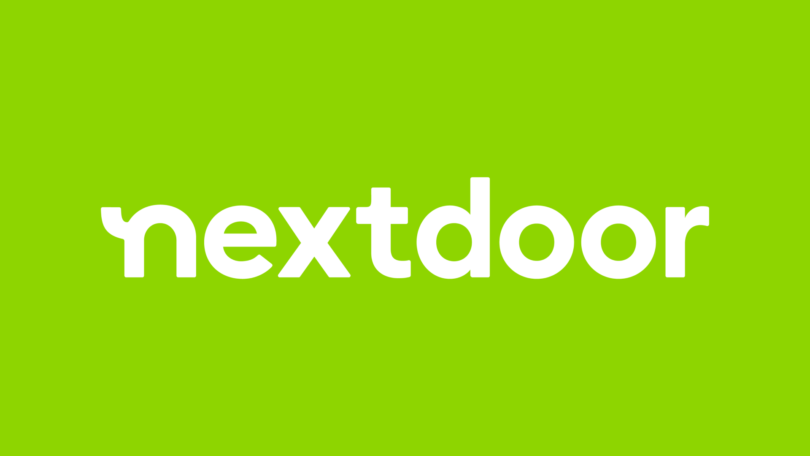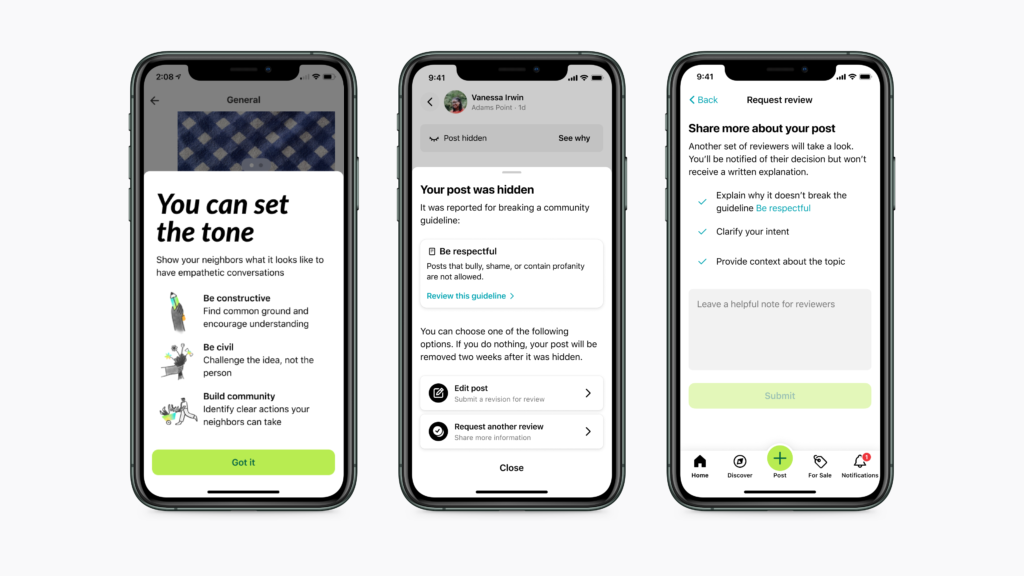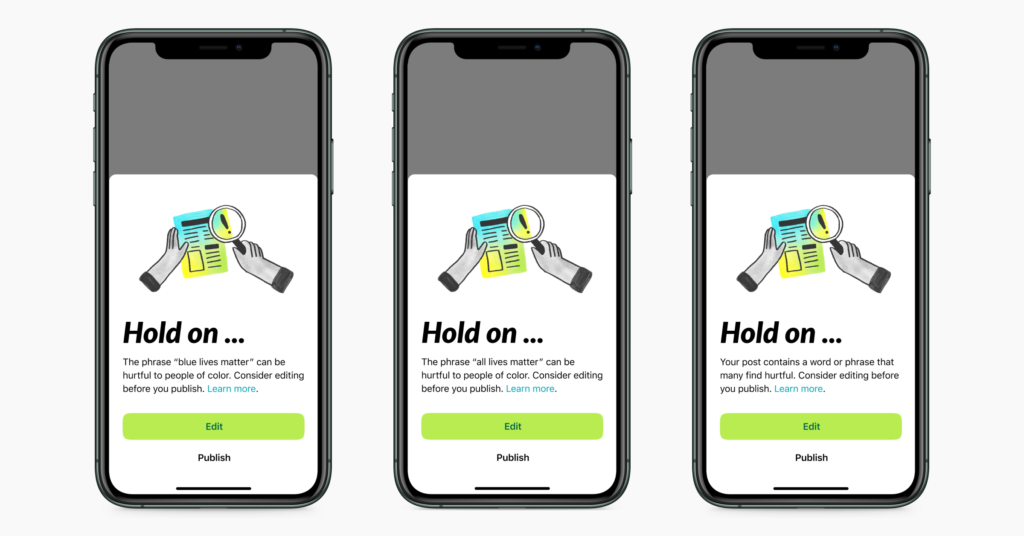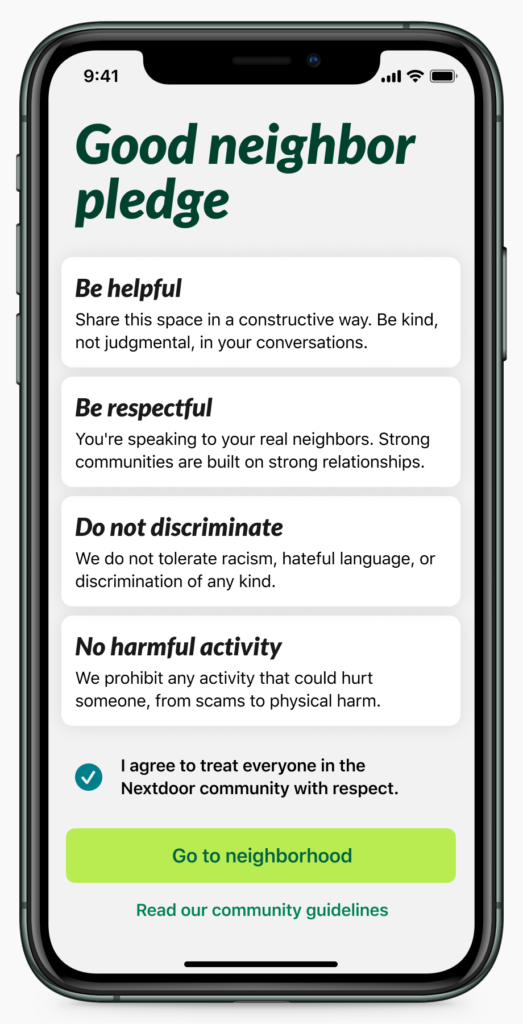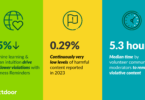Last updated on December 10, 2023
Nextdoor’s anti-racism and inclusion updates
At Nextdoor, our purpose is to cultivate a kinder world where everyone has a neighborhood they can rely on. We have taken a number of bold steps over the years to make Nextdoor welcoming for everyone, and we want to continue to keep neighbors updated on our progress. Here, you’ll find updates on Nextdoor’s initiatives to foster a holistically inclusive platform.
Table of contents:
- December 10, 2023
- November 28, 2023
- July 26, 2023
- June 16, 2023
- April 6, 2023
- February 27, 2023
- February 23, 2023
- February 1, 2023
- December 13, 2022
- November 14, 2022
- October 14, 2022
- July 20, 2022
- May 3, 2022
- February 23, 2022
- February 2, 2022
- October 29, 2021
- September 13, 2021
- August 30, 2021
- July 1, 2021
- June 25, 2021
- May 4, 2021
- April 19, 2021
- April 14, 2021
- March 25, 2021
- February 10, 2021
- February 8, 2021
- January 15, 2021
- January 11, 2021
- October 27, 2020
- August 11, 2020
- July 9, 2020
- June 11, 2020:
- Updates before 2020:
Updated on December 10, 2023:
Announcing the 2024 launch of Nextdoor AMP
Nextdoor is committed to creating a welcoming platform for all neighbors. Nextdoor has announced that we’re taking a significant step forward with the early 2024 launch of Nextdoor AMP (Amplifying Multicultural Perspectives.)
Nextdoor AMP is where community meets impact. It’s where we celebrate diverse voices and create a space for meaningful engagement and positive change.
Aiming to strengthen connections with Black and Brown communities, AMP combines ongoing community activations and meaningful dialogues, carefully selecting members for their hands-on community work and diversity, with plans to initiate a formal application process shortly.
Sign up to receive the latest updates and learn about upcoming events: https://nxdr.co/amp
Updated on April 6, 2023:
Understanding our neighbors to address bias and provide a safe and welcoming platform for all
As the neighborhood network, we know that the relationships sparked on Nextdoor help connect millions of people back to the original social network – the neighborhood. Everyone is a neighbor and Nextdoor is where people connect to the neighborhoods that matter to them.
Over the years, creating a welcoming platform for all has been a primary focus. We’ve prioritized kindness and our platform has changed to support the needs of our neighbors. Today, we’re introducing a new prompt on the platform, which enables all U.S. neighbors to share information about their demographics to help us measure and address potential bias. We want to better understand the neighbor population on Nextdoor and ensure we’re delivering a welcoming platform for all.
Sharing one’s information is completely voluntary – neighbors are not required to disclose any information. Neighbors who choose to participate may opt to share information on:
- Race/ethnicity identity– Data will only be used to understand and address potential bias, and will not be shared with others or used for marketing purposes.
- Gender identity & pronouns – Neighbors may also provide information about their gender identity, to help us understand and address potential bias. This data may also be used to customize your Nextdoor experience.
Notably, a neighbor’s information is confidential, fully secure and any neighbor can permanently remove their information at any time. Neighbors can also choose to publicly share their pronouns on their profiles. By voluntarily providing one’s personal demographic information to Nextdoor, neighbors can help Nextdoor become safe and welcoming for all. We recognize change is a process and this is one of many steps we are taking to improve the experience and help cultivate a kinder world where every neighbor has a neighborhood they can rely on.
Updated on July 20, 2022:
More than 35K neighborhood moderators have registered for the Inclusive Moderation course
Every human has biases in some way or another. The ways in which each of us grew into adulthood shaped our viewpoints on the world, creating both conscious and unconscious biases. Conscious biases are things we’re aware of, whereas unconscious biases are perceptions that take place without us even realizing they’re happening.
Both conscious and unconscious bias can be incredibly harmful to others, especially those who happen to be part of an underrepresented group or minority. At a minimum, biases result in a verbal, behavioral, or environmental slight towards someone, known as a microaggression. Other cases of extreme bias have led to physical harm, and even the loss of life by those in the impacted group. This is why we each have a responsibility to understand and repair our own biases, to ensure a safe and equitable world for everyone.
In May 2021 we partnered with The New Quo to launch our Inclusive Moderation course, designed to help neighborhood moderators learn how bias impacts communication and belonging in a community, and communication best practices for moderating and navigating biased posts. Since launch more than 35,000 volunteer moderators have registered for the course, with over 10,000 moderators fully completing the educational modules. This represents a 28% completion rate, which is +13 points above the online training industry average.
Updated on May 3, 2022:
New features to increase transparency and encourage constructive conversations
Today, we announced a suite of new product features to encourage neighborly interactions and promote neighborhood vitality. We continue to partner with key experts to bridge technology and social science in order to foster a welcoming platform.
The new “Constructive Conversations Reminder” reduces negative responses that are likely to occur during heated conversations. This is Nextdoor’s first step into predictive technology by using machine learning to anticipate when a comment thread may become heated before a neighbor contributes — specifically, this model considers the full conversation rather than the content of individual comments. When a comment thread shows certain indications of becoming contentious, a reminder will pop up before a neighbor writes a comment with tips on how to set the tone for a more empathetic discussion.
We are also introducing a “hidden content notifications and appeals” process to provide more transparency into the moderation process. Going forward, neighbors will receive an in-app notification if their post or comment was hidden, with an explanation of which guideline it violated and a chance to appeal the decision by submitting the same content or an edited version for additional review.
Updated on February 2, 2022:
Results from Nextdoor’s inclusive moderation course
Developed in partnership with The New Quo, a leadership and inclusion consultancy, Nextdoor launched an inclusive moderation course last year designed to help volunteer neighborhood moderators facilitate respectful conversations by learning the history and psychology of both conscious and unconscious bias, and gain knowledge of the best practices for building inclusive, respectful, and kind communities — both on Nextdoor, and in the real world.
An analysis by Stanford SPARQ, a “do tank” that partners with industry leaders and change makers to reduce societal disparities and bridge social divides using insights from behavioral science, found that >95% of course participants indicated they would take action when they encounter scenarios of tone policing, racial profiling, and coded language.
Updated on October 29, 2021:
Homelessness resource center and content reminder
To ensure neighborhoods on Nextdoor are welcoming for all, we have implemented a new feature to facilitate respectful discussions about unhoused neighbors along with resources to support neighbors experiencing homelessness.
We are introducing a pop-up reminder that detects potentially disparaging language about neighbors experiencing homelessness. The reminder educates the author about Nextdoor’s Community Guidelines against public shaming, and prompts the author to edit before posting.
Additionally, we have put together a resource center with tips on discussing homelessness on Nextdoor, information on how to help unhoused neighbors, plus insights about what it’s like to experience homelessness. Our team will continue to work to support and engage unhoused neighbors by partnering with public agencies and other local organizations.
Updated on September 13, 2021:
Spotlighting leading voices from Historically Black Colleges & Universities
Through a partnership with award-winning journalist Roland Martin for his daily digital show #RolandMartinUnfiltered we spotlighted the next generation of HBCU student leaders for the HBCU Connect segment to highlight what issues are important to them and how they’re leveraging Nextdoor for a variety of uses amongst their peers and involvement within the community.
As HBCUs continue to attract, groom, and produce the Black leaders of tomorrow, Nextdoor stands ready to provide them with a platform to enhance their collegiate experience amongst their peers and their community. Hear from students at Tennessee State University, Clark Atlanta University, Texas Southern University, and Tougaloo College about their experience.
Updated on August 30, 2021:
#WalkWithMe: A movement to build more inclusive, welcoming neighborhoods
We recently launched #WalkWithMe — a nationwide campaign calling on people to invite their Nextdoor neighbors to walk together to build more inclusive, welcoming neighborhoods. The movement was inspired by Shawn, a Black man who posted on Nextdoor to share he no longer felt safe walking in his Nashville neighborhood following the murder of George Floyd. In response, hundreds of neighbors showed up to walk alongside him sparking a nationwide trend of neighborhood solidarity walks.
This summer, dozens of neighbors shared an anniversary walk with Shawn through Nashville to celebrate one year since the movement began. There have been thousands of similar posts and comments on Nextdoor of people planning walks across the country. This movement, inspired by a true story, helps to build connections in the real world and ensure Nextdoor is a platform where all neighbors feel welcome. Learn more at nextdoor.com/WalkWithMe, and watch a video of Shawn’s inspiring story.
Updated on July 1, 2021:
Policy update on dehumanizing terms
We updated our racism and discrimination policy to ban the use of the dehumanizing terms, “illegals,” “illegal aliens,” or “aliens” to refer to non-citizens. As always, we are committed to removing any content (posts, comments, profile photos) or racist behavior that violate this policy. Furthermore, members repeatedly engaging in this behavior will be subject to temporary or permanent removal from Nextdoor.
Updated on June 25, 2021:
Inclusive logos and policies for cultural moments
To welcome and show support for neighbors of all backgrounds, we have introduced an inclusive design strategy to adapt the Nextdoor logo during cultural moments that call for equality.
For Juneteenth, we implemented a logo variation to honor and bring awareness to the abolishment of slavery in the U.S. and promoted a guest blog on ways neighbors can celebrate and honor Juneteenth.
For Pride in June, we updated our policy on discrimination and equality to explicitly state that any mistreatment, aggression, or unkindness shown to people on the basis of their gender and/or sexual orientation is expressly prohibited on Nextdoor. We know that LGBTQIA+ issues have a significant place in neighborhoods everywhere, which is why content discussing or celebrating LGBTQIA+ matters is allowed on Nextdoor as long as it adheres to our community guidelines. We then introduced a celebratory version of the Nextdoor logo that we hope will help make LGBTQIA+ neighbors feel seen and welcomed on Nextdoor.
Updated on May 4, 2021:
Policies on hate-related symbols
We’ve updated our hate and terror group policy to clarify some of the hate-related symbols that are prohibited for use on Nextdoor. This includes, but is not limited to, hate-related images, language, symbols, acronyms, and abbreviations. Examples of hate-related symbols banned by Nextdoor include swastikas, the Othala rune, the blood drop cross, the Confederate flag, hangman’s noose, and Q.
Updated on April 19, 2021:
Launching the anti-racism notification
Today, we announced the launch of the anti-racism notification to prevent language that could be offensive or hurtful to people of all backgrounds. The notification detects potentially racist phrases such as “All Lives Matter” or “Blue Lives Matter,” and prompts the author to consider editing their post or comment before it goes live. The anti-racism notification aims to make people aware of language that may violate our policy against discrimination and the harm that can be caused by the use of these phrases.
In 2019, we announced the kindness reminder, a first of its kind feature, that detects offensive language and encourages neighbors to edit before posting. That prompt has resulted in a 30% reduction in incivil content. Today, Nextdoor is taking this one step further with the launch of the anti-racism notification that detects language that could be specifically discriminatory to people of color.
Conversations on racial justice can be difficult, and they have a profound impact on our neighborhoods. Nextdoor exists to foster these important conversations in a civil, respectful way. To that end, we have provided tips to talk about race along with our comprehensive anti-racism resource hub to learn more and take action.
Updated on April 14, 2021:
Voting right access for all neighbors
Yesterday, we took an important step in support of protecting voter rights and opposing discriminatory voting measures. In doing that, we joined a coalition of business leaders that are focused on equal and fair voting access for all through various initiatives with the Black Economic Alliance and Business for America, American Civil Liberties Union and the Leadership Conference on Civil and Human Rights.
Updated on March 25, 2021:
Anti-racism policy updates
Today, we are taking steps to further align our community guidelines and policies with our company values and support for the Black Lives Matter movement. All Lives Matter and Blue Lives Matter content is explicitly prohibited when used to undermine racial equality or the Black Lives Matter movement. Support for White Lives Matter is prohibited on Nextdoor, as it is most commonly associated with white supremacist groups.
Updated on February 10, 2021:
Our approach to moderation
We posted a blog about Nextdoor’s layered approached to moderation, including that all reports of misinformation or racism are sent directly to and handled by our trained Neighborhood Operations team. Given that this content can be particularly sensitive, we rely on our internal agents who have special training to ensure consistent and objective outcomes.
Updated on February 8, 2021:
Partnering with the New Quo to increase inclusion and belonging
In partnership with The New Quo, Nextdoor has launched an online course specifically for Neighborhood Leads and Community Reviewers that provides tools on inclusive moderation and anti-bias education. This initiative furthers Nextdoor’s commitment to fostering a welcoming platform for all neighbors through people-based as well as technology-based interventions.
Updated on January 15, 2020:
Policies and actions on hate and terror groups
In light of last week’s violent events in Washington D.C., we updated our policy to make it clear that Nextdoor prohibits content and groups displaying support for hate and terror groups or their underlying ideologies. When designating hate and terror groups, Nextdoor may reference lists compiled by organizations such as the U.S. State Department, Southern Poverty Law Center, and the Anti-Defamation League which include the American Nazi Party, Boogaloo, Proud Boys, QAnon, and Al Qaeda, among others.
Additionally, we are sharing additional direction regarding the use of groups on Nextdoor.
Updated on January 11, 2021:
Reporting and removing content that violates our guidelines
In the aftermath of heightened political conversations, our Head of Community shared a post to our Nextdoor Community Forum, to provide clarity around our guidelines and support to our Leads and Community Reviewers.
Updated on October 27, 2020:
Creating a diverse & inclusive organization
We are committed to taking deliberate steps to increase diversity across our organization to make our team more reflective of the neighborhoods we serve today and the neighbors we will welcome in the future. Earlier this month, we announced the appointment of John Hope Bryant and Andrea Wishom to our Board of Directors. Mr. Bryant is the Founder, Chairman, and CEO of Operation HOPE, Inc., as well as the Chairman and CEO of Bryant Group Ventures and The Promise Homes Company. Ms. Wishom is the president of Skywalker Holdings LLC, a former Executive Vice President at Harpo Productions, and serves on the Boards of Pinterest and Tory Burch. Bringing leaders like John and Andrea to our Board highlights the importance of making diverse perspectives a business imperative. As we grow and tell the story of communities around the world, John and Andrea will help us accelerate the power of local, strengthening and lifting neighborhoods everywhere.
We are proud of the representation of diverse perspectives and expertise on all our Boards.
Underscoring the neighborhood as the unit of change
As part of Neighbor Month, in September, we embarked on a series of conversations to underscore how neighborhoods can be the unit of change. The series started with a panel discussion featuring small business owners and experts on what neighbors can do to help businesses, particularly minority-owned businesses, in this challenging time. The second was a conversation on how to create more inclusive and connected neighborhoods featuring activist Tamika Mallory, John Hope Bryant, CEO of Operation Hope, and Lorraine Cochran-Johnson, Dekalb County Commissioner. In October, in partnership with the African American Mayors Association, Nextdoor CEO Sarah Friar and Columbia, SC, Mayor Steve Benjamin talked about how neighbors continue to come together to help one another, rally around beloved local businesses and nonprofits, and roll up their sleeves to make their neighborhoods better and cities stronger. To follow all of these conversations, please visit nextdoorstory.com.
Improving resources for our moderators
We continue to strengthen our community moderation and are continuously improving the resources and support we provide to Neighborhood Leads and Community Reviewers whose work is central to ensuring that Nextdoor is a welcoming platform for all neighbors. We are working with The New Quo to roll out educational webinars and resources to help neighbors recognize and reduce bias in order to build more inclusive and kinder communities. Our first webinar in October was met with energy and thoughtfulness from all the participants. These sessions are where we will continue to learn what works well for the Nextdoor community and will also provide a rich environment for product feedback and improvements.
Thank you, as always, for working to connect with your neighbors and build stronger communities. Please continue to follow our progress on this blog.
Updated on August 11, 2020:
We believe Nextdoor has an important role to play in helping neighbors around the world build stronger communities. This update is focused on surfacing our community guidelines to members, increasing the number of members who review reported content and potential racial profiling posts, and creating an anti-racism resource center for anyone who wants to learn more about creating inclusive communities.
Creating a welcoming platform: Good Neighbor Pledge
We have rolled out our Good Neighbor Pledge globally. This pledge greets each person upon entering Nextdoor and is a pocket-size version of our community guidelines, which define the behaviors that are expected and the values of the communities we are helping to build. We want our platform to be a place where neighbors are respectful and everyone is welcome, and therefore accepting the pledge is required to use Nextdoor.
Creating a welcoming platform: New community reviewer role
Because every neighborhood on Nextdoor is unique, we have taken a community-driven approach to content moderation. Ensuring strong moderator coverage in neighborhoods is critical to the health of the Nextdoor ecosystem. Based on research we conducted and feedback from Neighborhood Leads, in the first quarter we began developing a supplement to our current Neighborhood Leads program with a new “community reviewer” role. Community reviewers, like Neighborhood Leads, will have the ability to vote to keep or remove reported Nextdoor posts and comments. We are inviting Nextdoor members who contribute positively to their community (reporting offensive content, and inviting, thanking, and posting helpful content) to become community reviewers.
Creating a trusted brand: Anti-racism resource center
Similar to our COVID-19 resource guide for businesses, we have created a new anti-racism resource center, which includes information on Nextdoor’s racism-eradication work as well as books, articles, videos, and podcasts on how to have constructive conversations about race, build inclusive communities, and take action in your neighborhood.
Thank you to everyone who is working to make their neighborhood on Nextdoor stronger and kinder. Please continue to follow our progress on this blog.
Updated on July 9, 2020:
A note from our CEO, Sarah Friar:
As I shared last month, racism has no place on Nextdoor, and we are committed to making our platform a place where everyone feels welcome.
Over the past month, we have been reaching out, listening, and learning. We have hosted discussions with Black Leads, members, employees, local businesses, and civil rights groups. We have also engaged with our Advisory Board members and external advisors, all of whom bring diverse perspectives and guidance to help inform our work.
Today, I would like to provide an update on our objectives and the actions taken to date.
Updating guidelines and features for diversity & inclusion
Community guidelines updates
- We have strengthened our community guidelines to more succinctly define the values of the community we want to build together at Nextdoor. Our objective is to have a platform where everyone feels welcome.
- We updated Nextdoor’s policy on racism, racial discrimination, and hate speech to better define what content is unacceptable, and to encourage members to consider how their words may affect a neighbor who reads them. Racism and discrimination create an environment of exclusion, intimidation, and fear.
- We clarified the guidelines on local versus national content that are allowed on Nextdoor and provided tips on how Nextdoor users can have respectful conversations. These guidelines received positive ratings from 90% of the members who viewed them.
- We are strengthening our community moderation system. This includes improving the resources and support we provide to Neighborhood Leads who work to maintain civil and productive conversations on the Nextdoor app.
- A wide range of public agencies — including cities, counties, mayors, governors, health departments, police departments, and fire departments — use Nextdoor to share locally relevant, real time information. We believe that providing neighbors with a way to engage directly with these agencies is a core part of building stronger neighborhoods, and we recently clarified how members can do this on Nextdoor. Conversations on Nextdoor remain private to the neighborhood — public agencies including law enforcement are not able to see these conversations or member profiles. Public agencies can only see member replies to their posts.
Updating and creating new features
- We began tests to turn posts with long comment threads into civil discourse groups, creating a dedicated space for members to have in-depth conversations on complex topics.
- We removed the Forward to Police feature to make Nextdoor a place where every person feels welcome.
Creating a connected community
Welcoming John Dokes and Sylvia Rosabal to our advisory boards
- External advisors play an important role in our company and our product, and in 2019 we established three advisory boards consisting of a diverse group of academics, industry experts, and community leaders.
- Neighborhood Vitality Board: This group of diverse academics and experts in the fields of social psychology, equality and civic engagement, advises on the necessary elements of thriving communities and building deeper connections between neighbors. We recently welcomed Sylvia Rosabel, a media executive in the Hispanic media industry. She has held senior positions with Telemundo and Univision spanning a 25 year career.
- Client Advisory Board: This group of marketing, branding and advertising experts advises on best practices, innovative ideas and guidance for our advertising initiatives, while ensuring value and differentiation, for both advertisers and members. We recently welcomed John Dokes. John has more than 20 years of marketing experience at well known brands including AccuWeather Network and Marvel Entertainment.
- Public Agency Advisory Board: This group of government experts — including representatives from cities, counties, mayor’s offices, governor’s offices, health officials, transportation departments, police and fire departments — advises on fostering connected communities and increasing civic engagement in neighborhoods around the world.
- Dr. Jennifer Eberhardt, a social psychologist at Stanford University, is a member of our Neighborhood Vitality Advisory Board, and we have been working with her since 2015. Dr. Eberhardt provided invaluable guidance in the revision of our in-product safety reporting flow, which resulted in a 75% reduction of Nextdoor racial profiling reports. We will continue our work with Dr. Eberhardt and her team on future work streams in the areas of bias.
Creating a diverse & inclusive company: Bringing new focus
- We have committed to taking deliberate steps to increase diversity and inclusion across our organization — to make our team more reflective of the neighborhoods we want to serve. As we recruit, we have engaged with consultants and agency partners to ensure we bring a critical eye to all that we do.
- We are actively hiring to better support our Neighborhood Leads and to build and maintain relationships with key partners that can help us ensure that Nextdoor neighborhoods truly reflect their communities.
Creating a trusted brand: Supporting organizations that fight for equality
- As a company we are able to support and highlight for our members organizations whose sole mission is to uphold social and racial equality. We are proud to be running pro-bono advertising to organizations such as NAACP, ViBe Theater Experience, and LA Voice, and will continue to add to this roster.
At Nextdoor, our hyperlocal platform can create connections and spark dialogue about important issues at the neighborhood level. Our responsibility is to ensure a civil and respectful environment that helps neighbors build enduring relationships and stronger communities. We know racial injustice will not be solved overnight, and much of the impactful work will take time and be ongoing. Meaningful change will only come from continuing to make this our number one priority across all areas of the company.
Sarah Friar, Nextdoor CEO
Updated on June 11, 2020:
A note to neighbors from our CEO, Sarah Friar
Let me say it unequivocally: Racism has no place on Nextdoor.
First, I want to express my outrage and sadness for those who have been hurt by the legacy of racism and racial inequality in the United States. I am heartbroken for those experiencing loss and grief right now.
Recent events have acutely exposed that some of the behavior we see on our platform is not at all in line with our values as a company. We’ve heard from many Black neighbors that they do not feel welcome and respected. For this, we are sorry. This, we must change.
Systemic racism in our nation will not be solved overnight. Neighborhoods, we believe, must be part of the solution. Nextdoor connects neighbors, creating dialogues with people you may not have otherwise known. These conversations can spark understanding — and drive change.
Nextdoor exists to foster these conversations in a civil, productive way. We are committed to building neighborhoods where everyone is empowered to participate. Our purpose at Nextdoor is to cultivate a kinder world where neighbors can rely on one another, where all feel welcome.
While we have been working for years to create this civil forum for discussions, it is time to expand our plan for improvements to our platform and our company. With our employees, neighbors, partners, and advisors, we are taking action.
We will better educate our neighbors on what is — and is not — allowed on our platform, drawing a firm line against racist behavior, racial bias, and racial profiling and removing comments and members who violate the rules. We will accelerate our plans to strengthen our community through inclusive moderation. This will include improving the resources and support we provide to Neighborhood Leads who work to maintain civil and productive conversations on Nextdoor. We will also take deliberate steps to further increase diversity across our organization — and to make our team more reflective of the neighborhoods we want to serve.
This is important work, and there is much more to come. We are committed to plotting a clear path forward, where Nextdoor becomes a destination for vital conversations and trusted connections.
This change starts with sidewalk conversations and simple offers to help our neighbors in need. It will happen as we lean on each other through hurricanes and health crises, or when we come together at park cleanups and community cookouts. The important conversations start with these moments, at these intersections.
Only when we really see each other, will we begin to resolve our differences. Together, we will create a Nextdoor where everybody belongs.
This is only the beginning.
Sarah Friar, Nextdoor CEO
Summary of Nextdoor’s anti-racism and inclusion efforts prior to 2020
Since 2015, we have partnered with Dr. Jennifer Eberhardt, a social psychologist and the author of Biased, to better understand how to mitigate implicit bias and prevent racial profiling on Nextdoor. We found that adding friction to the posting process helps slow people down and consider their own implicit bias. The result was a complete overhaul of our crime and safety post flow that helps to educate members around bias and forces people to slow down and think before they post. Ultimately, these tactics have led to a 75% decrease in racial profiling on the app.
Later, we developed a feature called the Kindness Reminder, which automatically flags offensive or hurtful comments and encourages the author to be more kind and thoughtful when they post. This prompt resulted in a 30% reduction in incivil content.
In 2019, we also introduced our Neighborhood Vitality Advisory Board of experts that helps us foster healthy and productive conversations online and offline. This group of diverse academics and experts brings us important insights from the fields of social psychology, equality, and civic engagement. They advise Nextdoor on the best ways to support thriving communities and build deeper connections between neighbors while preventing racial profiling.
To stay up-to-date on the progress of our work, please continue to visit our blog.
To connect with your local neighborhood, please login at nextdoor.com.

